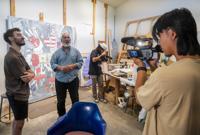
Joseph Balderas realized his childhood dream when he finally stepped foot on a professional film set in April 2024.
“I was like a kid in a candy store,” said Balderas, a cinematic arts graduate student.
The experience, earned through a UTA professor’s recommendation, gave Balderas a firsthand look at how a $10 million film set operates as a production assistant. He endured long days and saw specialized roles, but Balderas also received networking opportunities, potentially providing him a job in Los Angeles.
For over two years, UTA’s Cinematic Arts department has adapted to better prepare students for film and TV production career paths that once could only be obtained living in Hollywood. The department built up its curriculum to provide more opportunities to apply for film festivals and professional networking.
The move arrives as the film industry looks increasingly at the Dallas-Fort Worth area for more productions. Already, North Texas Taylor Sheridan films many of his TV shows, including the “Yellowstone” prequest “1983,” in Fort Worth.
Lawmakers see Texas’ rising star, too. On April 16, the Texas Senate passed Senate Bill 22 that would infuse more than $500 million into the Texas Moving Image Industry Incentive Program every two years until 2035. The amount more than doubles the $200 million that Texas lawmakers approved in 2023.
UTA will greatly benefit from SB 22 if it passes, said associate professor Daniel García. The bill is now in the hands of the House.
In fall 2025, the department will present a studio readiness certificate, which validates people to walk on sets and have entry-level positions like production assistant, García said.
The certificate requires classes like the five basic ones, such as screenwriting and cinematography. The department will have intensive weekend workshops where students can hear from different film crews throughout the semester, said Patty Newton, associate professor of practice.
Crew members will come from either equipment, lighting or other art departments, Newton said.
The certificate focuses on teaching students about assistant roles and how to behave on set, said August Davis, Art and Art History department chair.
Newton calls them “set-iquettes” — intangible skills not taught in a classroom: when to talk, when not to, who to talk to or how to drive a golf cart.
“It’s kind of an unwritten approach to dealing with a situation where there’s a whole lot of money at stake,” she said. “If you pick up the star in your golf cart, and you take them to the wrong place, and we’ve lost two minutes because of that, they could have lost the sunrise or the sunset and the shot.”
“And suddenly you’ve lost your job.”
On film sets, Balderas observed professionals in their environment. He watched what they did and started asking questions — learning experiences that hypothetical situations in the classroom can’t fully encompass, he said.
“They were essentially holding me by the hand and kind of laughing along with me, and they were like, ‘Oh, this is how it works,’” he said.
The growth of production companies in North Texas allows the area to shift from filming commercials to focusing more on TV and movies, which requires longer hours on set, Newton said.
At 32, Balderas is in his second career. He initially graduated from UT Rio Grande Valley with a bachelor’s in English and a master’s in creative writing before teaching at a local community college. But he felt something was missing during the COVID-19 pandemic.
“I felt like I was doing a disservice to my students,” Balderas said about his impostor syndrome.

During that time, Balderas cared for his father, and they made a short film together. A spark was reignited.
He pursued a second bachelor’s degree in theater and film at UT Rio Grande Valley, where he noticed holes in its curriculum. So he pursued a master’s degree at UTA.
During the early days of the pandemic, Changhee Chun, Art and Art History professor, saw a growing demand for his students at Maverick Film Productions. He launched the production company about eight years ago to provide students with professional opportunities outside class assignments.
Maverick Film Productions now has about 13 students with varying majors, Chun said. The company handles 20 to 25 professional productions each semester, ranging from promotional videos, music videos and live streaming campus events to feature-length documentaries.
Clients are split in half between companies, such as Central Market and Dickies, and UTA campus partners. They have reached a point where they can deny projects due to over demand, Chun said.
“We are here to educate our students, so I think Maverick Productions is doing that,” he said.
The production company puts students in a different mindset. If they don’t do well on an assignment, they can redo it or use it as a learning opportunity. Tensions are higher on professional sets.
“Especially like live streaming or filming actual events and so on, if you make one mistake, that’s it. You don’t have a second chance, right?” Chun said.
Cinematic arts senior Jose Morales said the experiences at Maverick Film Productions keep him on his toes.
“You don’t really do that when you’re doing a film production,” Morales said.
The department’s faculty are active filmmakers who have received awards, screenings and recognitions internationally, Davis said. They use those experiences to help students navigate the industry and develop their body of work.
“It’s playing chess, you know, setting up a career in a really hard-to-get-into industry and even harder to stay in sometimes,” Newton said.
For the last two years, the department has collaborated with the Lone Star Film Festival in Fort Worth to bring student screenings to the festival’s official program, Davis said.
“This connection and this synergy with the really new filmmaking community in this area, it’s energizing our students very much and obviously our faculty,” García said.
In midst of all the economic developments from North Texas film sets, UTA’s Cinematic Arts department doesn’t forget its goals.
“We form the storytellers,” García said.
As part of his class assignment, Balderas was asked to submit his narrative fiction film, Dad Died Crying, to a film festival. He submitted it to about 15 — and 10 accepted, including the Lone Star Film Festival.

The narritive fiction film focuses on two brothers reconciling their relationship while burying their father’s ashes. Balderas draws some of the plot from his real-life experience.
He filmed the whole piece in his hometown, the Rio Grande Valley area, to pay homage to the place that gave him the skills to come to Dallas-Fort Worth, he said. His upcoming work is also inspired by his experiences, and his storytelling reflects personal relationships.
Balderas appreciates the opportunities he received at film festivals — even the invitations to Los Angeles.
He once had dreams of Hollywood, living in his car and dying for his film.
He has set his future.
He will go back to Edinburg, Texas, for the full circle moment to build UT Rio Grande Valley’s film program using what he has learned from the growth of production in Dallas-Fort Worth.
@DangHLe















